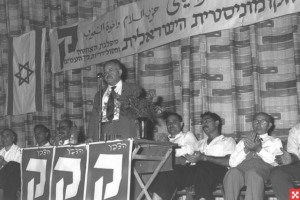Nationalism beyond Zionism: Lessons from Jewish Communists in Palestine

Israeli Communist Party MK Moshe Sneh speaking at an election campaign event in Ramat Gan, 30 October 1959
Shaul Magid writes a review of Holidays of the Revolution: Communist Identity in Israel, 1919-1945, by Amir Locker-Biletzki, State University of New York Press, 2020 in +972:
When the story of Israel is told, certainly by Jews, it is almost always told from a Zionist perspective. For example, Arthur Hertzberg’s “The Zionist Idea” (first published in 1959) collects myriad examples of Zionist ideologues to illustrate the plethora of visions that existed within the Zionist movement. Anita Shapira’s comprehensive “Israel: A History” (2012) is likewise written fully within the Zionism paradigm.
The far left of that story are the Socialist Zionists, in part embodied by the Hashomer Hatzair and Habonim kibbutz movements and thinkers such as Ber Borochov or Nachman Syrkin, both architects of the Zionist labor movement. But there were other Jews in Palestine during those heady years who are often excluded from the story because they were decidedly anti-Zionist.
That’s right: Jews who lived in Palestine for the purpose of building a collective Jewish existence who were, nevertheless, anti-Zionist. I do not refer to Haredi anti-Zionists who thought Zionism was heresy, or the Canaanites who wanted to found a new Hebrew civilization divorced from Judaism and the Jewish diaspora. Both of these were marginal, more a curiosity than a real threat to the Zionist mainstream. I refer, rather, to Jewish Communists, internationalist revolutionaries with strong ties to Trotsky and the Comintern (the Third International Communist organization) who viewed Palestine as a location for Jews and Arabs to join forces in the global battle against capitalism and imperialism. (By Arabs here I refer only to Muslim and Christian Arabs, not Jews from Arab lands.)
Amir Locker-Biletzki’s excellent new study Holidays of the Revolution: Communist Identity in Israel, 1919-1945 (SUNY Press, 2020) offers a fresh look at Jewish Communism in Palestine/Israel — not only from a political perspective, but from a cultural one as well. How did Jewish Communists confront, resist, and at times absorb their Socialist Zionist opponents? How did they construct a Jewish national identity against the Zionist one? How did they support Arab-Jewish solidarity while cultivating a Jewish nationalist (albeit anti-Zionist) program? And what can we learn from these Jewish Communists in today’s world where Zionism has arguably congealed into a chauvinist movement and, via the 2018 Jewish Nation-State Law, has codified its rejection of equality in Israel for all its citizens?
The post-Nation State Law, uber-capitalist Start-Up Nation is still mired in the highly ideological conundrum of its inception. An alternative to Zionism can still be gleaned from the (arguably archaic) communist battle against what the Jews who waged it saw as Zionism’s bourgeois and imperialist roots.
From ‘Jewish labor’ to Arab-Jewish solidarity
Locker-Biletzki writes, “At the core of the Jewish-Israeli Communist identity stood anti-Zionism. From its formative stages, Communists in Palestine-Israel preferred Socialism over Zionism.” This antagonism between seemingly adjacent ideological groupings is not unusual. The ultra-Orthodox anti-Zionists viewed the non-Zionist and religious Agudat Israel (founded in 1922), rather than secular Zionism, as their main opponents. They argued that Agudat Israel’s collusion with the Zionists sullied their own religious and ideological commitments. In a similar way, the Jewish Communists viewed the Socialist Zionists as their opponents, “subordinating their Marxism to their Zionism.” The Hashomer Hatzair movement often referred to their position as “Socialist realism,” which amounted to a merging of socialism and nationalism.
Locker-Biletzki shows the story was more complicated still. The Communists themselves “selectively used the cultural means and mechanisms created by the Socialist-Zionists in their own subculture.” The Communists in Palestine/Israel could not avoid the Zionist orbit in which they lived, even as they continued to try to find alternative ways of cultivating a national consciousness that remained wedded to the revolutionary project of class struggle and committed to the Jewish and Palestinian working class.
